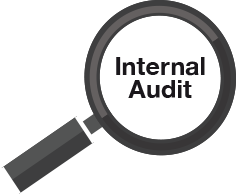Many times the management of an organization or the board of a company has to reflect on the operations of their enterprise. Are the goals being met? Are accounting policies and standards being followed? Is the risk being managed? An internal audit is a great way to answer these questions. Let us take a look at some advantages and limitations of internal audit.
What is an Internal Audit?
An internal audit is the evaluation of all aspects of an organization by an internal auditor, i.e. one who works as an employee of the organization. He keeps tabs on the financial reporting, accounting, operations, risk management, internal controls and all other such aspects of an organization.
Unlike a statutory audit which only happens at the end of the year, an internal audit is recurring. An internal audit may happen daily, weekly, monthly, quarterly etc. It is, in fact, a continuous process.
Learn more about the Objectives of Internal Audit here in detail.

Advantages of Internal Audit
1] More Effective Management
One of the biggest benefits of an internal audit is that it facilitates more effective management of the organization.
The internal auditor will be able to point out any weaknesses of the organization in the operations or internal controls of the company.
So the management can use these insights to better the chances of achieving their goals.
2] On going Review
The process of internal audit gives the organization a unique opportunity to conduct a review of the performances in the ongoing year itself.
They do not have to wait for the end of the year to review the company’s performance. This also means that if they are not on the correct path, this will help them change course and correct their mistakes immediately.
3] Performances of Staff Improve
The staff of the company remains alert and active. This is because there is the fear of their mistakes being caught by the internal auditor almost immediately.
This will help improve their efficiency and performance. Also, they do not attempt to defraud the company for the same reasons. And on the other hand, it is a good morale booster for honest employees.
4] Ensures Optimum Use of Resources
One other benefit of the process of internal control is that it can be used as a tool to promote the optimization of resources. It will help point out the areas in which resources are being underutilized or wasted. And then these can be corrected. It will help control the costs and expenses of the company.
5] Division of Work
Internal audit helps promote the division of labor. It is important to keep a check on and observe the activities of all the departments and all of their employees. Division of labor will help in achieving this.
Limitations of Internal Audit
Now let us move on to the limitations of internal audit. Like every good thing has a flip side, there exist some concerns about these limitations of internal audit. Let us take a look.
1] Shortage of Qualified Staff
The work of an audit requires years of study and experience. An inexperienced auditor can cause more damage than good. So usually, the company will find it somewhat difficult to find enough qualified staff members for the process of an internal audit.
2] Time Lag
There will always be a time lag between accounting and auditing. Internal audit cannot begin till the accounting is complete. They cannot be done simultaneously. So if the accounting process is delayed, so is the internal audit.
3] Ignorance of Management
Unlike a statutory audit, the findings of an internal audit are not published or made available to all. Their findings are only forwarded to the management.
Now even if an internal audit reports points out to the shortcomings of the company or the errors in the financial statements, the management may not take corrective action.
They can choose to ignore such findings and then there will be no benefit gained from the internal audit.
Solved Question for You
Q: A proprietorship cannot conduct an internal audit. True or False?
Ans: False. Any organization, irrespective of its structure, can choose to carry out an internal audit even if it is not mandatory.






Leave a Reply